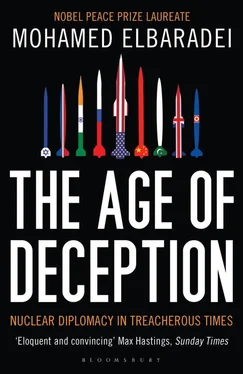As a young Egyptian lawyer and professor of international law in New York in the early 1980s, I felt a resonance with the Atoms for Peace ideal. I joined the IAEA in 1984 and became its legal adviser three years later. By the time of the 2003 Iraq War, I had been the IAEA Director General for more than five years and part of the Agency for almost two decades. I had immersed myself in the Agency’s nuclear diplomacy mission. For a war to be fought over unsubstantiated WMD charges—and for the IAEA’s nuclear diplomacy role to be pushed to the side, serving as merely a fig leaf of due process—was for me a grotesque distortion of everything we stood for. It went against nearly half a century of painstaking labor by committed scientists, lawyers, inspectors, and public servants from every continent. I was aghast at what I was witnessing. The thought that would not leave my head was the certainty that nothing Blix or I had seen could possibly justify going to war.
General Amir al-Sa’adi, my melancholy dinner partner, turned himself in to coalition forces on April 12, 2003, after he learned that he was number thirty-two on the list of the most-wanted Iraqis and the seven of diamonds in the infamous deck of playing cards. He asked the German television station ZDF to film his surrender. Speaking into the camera, he announced, “We have no weapons of mass destruction, and time will bear me out.” It was clear to me then that our provisional conclusion regarding nuclear weapons was correct, because by that time al-Sa’adi had no reason to lie.
In the years since, multiple sources have confirmed that the premise for the March 2003 invasion—the charge by the United States and the United Kingdom that Saddam Hussein’s WMD programs represented an imminent threat—was groundless. The U.S.-appointed Iraq Survey Group would later spend billions of dollars to verify that the international inspectors were correct: Iraq had not revived its WMD programs. Nor, apparently, was the alleged WMD threat the real motivation for the U.S. and U.K. aggression. The famously leaked “Downing Street” memo from July 2002 was one of several sources indicating that the decision to go to war had been taken well before the inspections ever began.
To this day, I cannot read such accounts without reflecting on the thousands of soldiers who have died, the hundreds of thousands of Iraqi civilians killed, the millions maimed or displaced, the families disrupted, the lives ruined—and I am astonished that there has not been more self-examination, more introspection on the part of the principal players. The shame of this needless war obliges us all to consider what went wrong in the case of Iraq and to reflect on how the lessons of this tragedy might be applied to future crises.
The tensions over nuclear developments that are now agitating the world, particularly in relation to Iran, suggest that we could yet repeat the Iraq catastrophe, with even worse ramifications for global security. When I consider the challenges still confronting us, I often come back to the scene of our February 2003 dinner in Baghdad, because it so epitomizes the core aspects of the dilemma we face as a global community in search of an enduring and collective security: the increasing distrust between different cultures; the corrosive effects of a long-standing system of nuclear haves and have-nots; the folly of nuclear brinksmanship; and the certainty of doom if we are unable to learn from our past mistakes. That dinner scene is also important for what it is missing: the principal players—in this case the United States and the United Kingdom—whose decisions would actually determine the result. Their absence would become a recurrent motif in the years to come, particularly in Iran: the United States overshadowing negotiations from a distance, shaping the outcome while refusing direct participation. Nuclear diplomacy is a hands-on discipline requiring direct engagement, restraint, and long-term commitment. It cannot be performed by remote control. If dialogue is to be used as a tool to resolve nuclear proliferation tensions, it cannot be limited to a conversation between the inspectors and the accused country. The United States and its allies must be genuinely engaged in the discussions, speaking with their perceived adversaries, demonstrating by more than lip service their commitment to a peaceful resolution of the underlying insecurities. All parties must come to the negotiating table.
The dinner in Baghdad—which some of my colleagues have wryly dubbed “The Last Supper”—was only one of multiple crises unfolding in early 2003. North Korea had just expelled the IAEA inspectors monitoring the “freeze” on its nuclear facilities, and declared its intention to withdraw from the Nuclear Non-Proliferation Treaty. We were just beginning to probe the extent of the Iranian nuclear program and, with several IAEA colleagues, I was about to make my first visit to a nuclear enrichment facility under construction in Natanz. Libya soon would begin making overtures to the United States and the United Kingdom about dismantling its WMD programs. And the first vague outlines of an illicit and shadowy nuclear supply network were just starting to appear; eventually, we would find traces of its activity in more than thirty countries.
We now know more, a great deal more, about each of these cases of real or potential nuclear weapons proliferation. The circumstances in Iran and North Korea, in particular, remain fluid and unpredictable. What we still do not have is a practical, responsive approach for dealing with these or future cases. What we need is a commitment to nuclear diplomacy.
The First Nuclear Age was a race for the A-bomb, a competition among relatively few countries who either possessed the necessary technological sophistication or were able to obtain clandestinely the science needed to make a nuclear weapon. The climax of that race, the destruction of Hiroshima and Nagasaki, marked the United States as the winner. But the other contestants did not give up. Within a few years, four other countries had managed to acquire the bomb.
What we remember as the cold war was the Second Nuclear Age. While several countries possessed nuclear weapons, and others continued to work on the technology, this was really the era of two giants: the United States and the Soviet Union, each amassing tens of thousands of warheads, in a philosophy known as MAD, Mutually Assured Destruction, masquerading as “nuclear deterrence.”
The Third Nuclear Age, the current era, dawned after the Soviet Union fell apart. In the vacuum of power that followed, the political community failed to capitalize on the opportunities for nuclear disarmament. As a result, more and more countries began to consider if not a clandestine weapons program, then at least a full nuclear fuel cycle that would render them capable of rapidly producing a nuclear weapon if their security situation so warranted.
The primary danger at this moment is not the MAD scenario, massive, silo-emptying exchanges of nuclear arsenals wiping out the major metropolises that house capitalism and communism, but the threat of asymmetrical atomic warfare: the acquisition and use of nuclear weapons by extremist groups or a “rogue” country headed by an aggressive dictator, or the use of a nuclear weapon by a major power against a non-nuclear-weapon state.
This situation is inherently unstable, and the developments of recent years have only exacerbated this instability. We have witnessed aggression where there was no imminent threat (in Iraq); inaction and vacillation while a real threat emerged (in North Korea); and a protracted stalemate fueled by insult and public posturing instead of meaningful dialogue (in the case of Iran). Along the way, we have uncovered an illicit and thriving nuclear network ready to supply clandestine nuclear programs. Meanwhile, the continued reliance on nuclear weapons by a few countries is a constant incentive for others to acquire them.
Читать дальше












